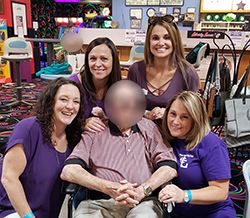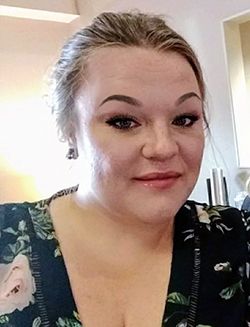Honoring a Veteran with a Purple Heart
This story is about a Purple Heart Veteran Right at Home Belmont, NC has the honor to serve.
Edward Smith* was an officer of the U.S. Marine Corps and awarded multiple Purple Hearts while operating in Vietnam and other undisclosed locations around the world. After retiring from the Marines, he continued to protect and serve our country in ways that remained classified. He was briefly married early in his career but does not have any children or siblings. Smith established a living will that specifies his wish to never be admitted to any skilled nursing facilities.
The decorated veteran had a recurrent stroke in April, 2018. After hospitalization and rehabilitation, his longtime friend and Power of Attorney enlisted help from Right at Home Belmont, NC, providing 24/7 care and assistance for Smith so he can return home.
“Our caregivers have become his family,” says Bill Osborne, owner of Right at Home. “And we are going to see it through.”
Supporting Quality of Life with Dementia
His strokes may have caused his vascular dementia, but his caregivers said that dementia has not affected him from engaging with people around him. “Edward is witty, smart and knowledgeable with what’s going on. You can have long, in-depth and intelligent conversations with him,” says Mercedes Goodwin, a Personal Care Assistant (PCA) and the night time caregiver of Smith.
Through conversations, Goodwin learned that Smith likes going out and loves children; “Before the first stroke happened, Edward would go to the sports store, buy gears and freely give them out to kids. He would buy baseball gloves and donate them to the local baseball team.”

Although the strokes had made Smith less mobile and hindered him from going out, his caregivers would assist him to dinner at restaurants and community events on occasion. For example, they recently brought him to the yearly Right at Home Bowling Tournament fundraiser for the Alzheimer’s Association North Carolina. “He was in a wheelchair. We (his caregivers) wheeled him down to the tournament venue. There were many teams participating and we got his favorite team to come over and see him. When the whole team got around and took a picture with him, that just made his day,” says Osborne.
Redirecting Dementia and Post-Traumatic Stress Disorder Behaviors
But when the sun comes down, things can get a little more challenging for Smith. At times, he would wake up in the middle of the night in a panic, showing signs of post-traumatic stress disorder. While it’s not uncommon for dementia patients to have their sleep disrupted because they were reliving a past memory, Goodwin said that Smith’s condition is slightly different.
“Other dementia patients may wake up out of their sleep randomly, but for him, there was more of a panic when he woke up,” Goodwin explains. “One time he talked about a gun and got very into it. He was overwhelmed and wanted to tell me something. You could tell that the memory triggered more and more subjects about the war and his time in the Marines.”
At times like that, Goodwin would try redirect Smith’s thoughts to other subjects that he is passionate about. And if that does not work, she would offer him a snack or suggest some TV time to give his mind a break.

“A good night’s sleep is good for his body, but I definitely don’t mind staying up and having conversations with him. Conversations help him a lot when he has an episode.” Goodwin says. “And I also get to have quality time with him, which can be hard for a night shift caregiver.”
Before Smith, Goodwin had taken care of both her grandparents, who were also diagnosed with dementia; “Dementia is different in every case. Experience with every dementia patient is unique; it’s never the same. Edward is definitely one of those patients that just absolutely grasp your heart. He’s been a joy and I am honored to take care of him.”
*The name of the client has been changed to protect the client's privacy.



